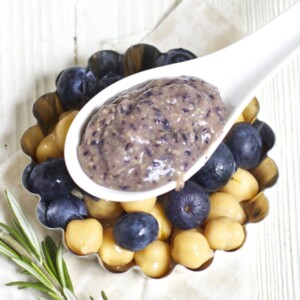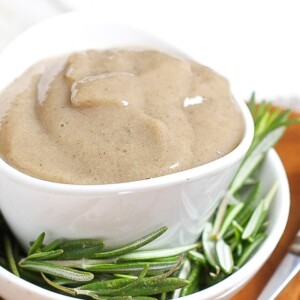Rosemary Profile
Medically reviewed and cowritten by Jamie Johnson, Registered Dietitian Nutritionist (RDN).
Rosemary for Baby
This delicious and aromatic herb will help expand your baby’s taste buds! The woodsy-citrus-like fragrance of rosemary makes it one of the best herbs to cook with, but it has many other uses and nutritional benefits. Rosemary contains antibacterial and antioxidant rosmarinic acid and several essential oils known to have anti-inflammatory, anti-fungal, and anti-septic properties! Rosemary even contains compounds that may make it useful for reducing the severity of asthma attacks. Are you looking to add some flavorful zing to your baby’s foods or broaden their palate? Rosemary adds a wonderful flavor to fruit purees, many savory dishes, and even sweet baked goods that your baby will love!
HEALTH BENEFITS OF ROSEMARY
Because we don’t tend to eat large doses of rosemary in a sitting, you won’t get many nutrients at once, but rosemary is known to have health benefits and has been used medicinally for hundreds of years.
- Its microbial properties are used to fight infections
- It has antioxidants which have been shown to have antitumor properties and fight cancer
- The aroma of rosemary can help improve memory and concentration
Highlighted Nutritional Importance of Rosemary
Vitamins
Vitamin A – this vitamin is a great antioxidant and will help provide baby with vision protection and healthy skin
Vitamin C – a collagen synthesizer (for baby’s skin), this vitamin is required for optimal blood vessels, organs, skin and bones
Folate – otherwise known as Vitamin B9, this vitamin helps the body produce healthy red blood cells and helps support healthy growth and development
Minerals
Calcium – a vital mineral for building strong bones and teeth and promoting nerve and muscle function
Iron – needed for hemoglobin production, which is the protein that carries oxygen through our blood
Manganese – plays a critical antioxidant role in the body and helps baby grow healthy bones
How to Select and Store Rosemary for Baby Food
Choose fresh rosemary over dried whenever possible for the best flavor. Rosemary sprigs should be deep sage green in color and free from yellow or dark spots. Store fresh rosemary in the refrigerator in a damp paper towel or wrapped tightly in its original packaging. Dried rosemary should be kept in a tightly sealed container and will keep fresh for about six months.
Using spices and herbs in your baby’s foods is a great way to introduce them to fun, interesting flavors. When preparing fresh rosemary for your baby, quickly rinse and remove the leaves if you plan to use it in a puree. You can also add an entire sprig to season soups or broths for baby.


